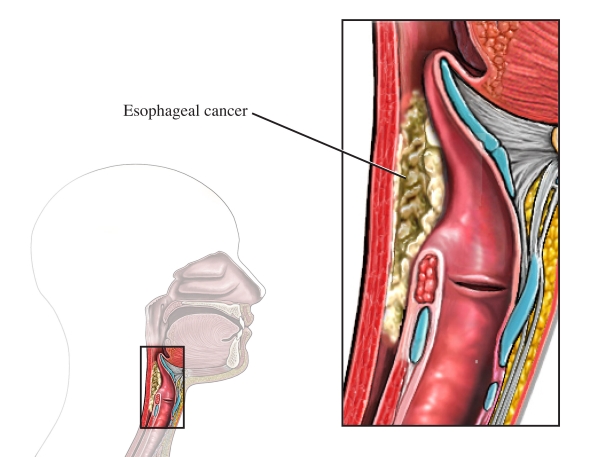Esophageal Cancer Facts
What Is Esophageal Cancer?

Esophageal cancer is a disease in which cells in the tissues of the esophagus — a hollow muscular tube that moves food and liquid from the throat to the stomach — become abnormal and grow and divide uncontrollably into tumors.
The Two Most Common Types Of Esophageal Cancer Are:
- Squamous cell carcinoma: Cancer that begins in the squamous cells, which line the esophagus. This type of cancer can occur anywhere along the esophageal tract.
- Adenocarcinoma: Starts in gland cells, which produce and secrete mucus that helps food move through the esophagus. This type of cancer is more common in the lower esophagus.
Other cancers, such as lymphomas, sarcomas and melanomas, may start in the esophageal tract, but they are exceedingly rare. Each type of esophageal cancer grows and is treated in different ways. A multidisciplinary team will work together and carefully study your individual case to determine the best treatment plan.
What Are The Signs And Symptoms Of Esophageal Cancer?
There is no standard screening test for esophageal cancer. It is usually found as a result of symptoms caused by the cancer.
Symptoms can include:
- Trouble (or painful) swallowing
- Chest pain, particularly behind the breast bone
- Weight loss
- Persistent hoarseness and coughing
- Esophageal bleeding, which can lead to black stools
- Frequent vomiting and hiccupping
Many of these symptoms may be caused by other conditions, so it is important to rule those out before pursuing screening for esophageal cancer. If you or a loved one is experiencing any of the above symptoms, please contact a doctor for further evaluation.
What Are The Risk Factors Of Esophageal Cancer?
- Age: The chance of getting esophageal cancer increases with age; more than 85 percent are diagnosed in people age 55 or older.
- Alcohol: Alcohol consumption is linked with a higher risk of esophageal cancer, particularly in people who do not metabolize alcohol well due to an inherited enzyme deficiency.
- Barrett’s esophagus: Chronic reflux of stomach acid in to the esophagus can damage the inner lining of the esophageal tract. Over time, the normal squamous cells lining the esophagus are replaced with gland cells — a condition known as Barrett’s esophagus. This increases the risk of adenocarcinoma.
- Diet: A diet high in processed meat may increase esophageal cancer risk, while a diet high in fruits and vegetables may lower it. Additionally, drinking very hot liquids frequently may increase risk due to its long-term damage to esophageal lining.
- Esophageal conditions: In addition to Barrett’s esophagus and GERD, people with conditions such as achalasia (the esophagus sphincter fails to relax properly), Plummer-Vinson syndrome (which causes esophageal webs that can obstruct food’s passage into the stomach) and tylosis (an inherited disease that predisposes people to develop small esophageal growths) are at an elevated risk for developing esophageal cancer.
- Gastroesophageal reflux disease (GERD): For people with GERD, the digestive enzymes and acid in the stomach escape into the lower part of the esophagus, causing frequent heartburn or pain in the middle of the chest. People with GERD have a slightly elevated risk of getting adenocarcinoma of the esophagus. GERD also elevates the risk of developing Barrett’s esophagus, another risk factor for esophageal cancer.
- Gender: Men are three times more likely than women to get esophageal cancer.
- Overweight/obesity: People who are overweight or obese have a higher chance of developing esophageal cancer, possibly due to their higher likelihood of experiencing gastric reflux.
- Tobacco: The use of cigarettes, cigars, pipes or chewing tobacco has been linked to a higher likelihood of developing esophageal cancer. The risk increases with more frequent or prolonged use of tobacco products.
Sources: American Cancer Society, National Cancer Institute